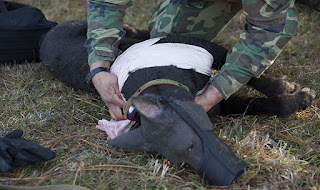Crédits photo Créateur :Cpl. Bryann K Whitley
malaria sniffing dogs
Although the research is still at an early stage, it is hoped that specially-trained sniffer dogs may one day be used in
airports to screen people for the disease.
Researchers have found that dogs were able to scent malaria in socks worn by infected children from The Gambia in West Africa.
Funded by the Bill & Melinda Gates Foundation, the research has been carried out by Durham University, the charity Medical Detection Dogs, the London School of Hygiene & Tropical Medicine, the University of Dundee, the Medical Research Council Unit The Gambia at the London School of Hygiene & Tropical Medicine, and the National Malaria Control Programme, The Gambia - malaria sniffing dogs.
Trained by Milton Keynes-based Medical Detection Dogs, Lexi, a Labrador X Golden Retriever, and Sally, a Labrador, were able to correctly identify 70 percent of socks worn by children with the malaria parasite in their blood, plus 90 percent of socks without. A third dog, Springer Spaniel Freya (pictured),
has since also been trained to detect malaria.


No comments